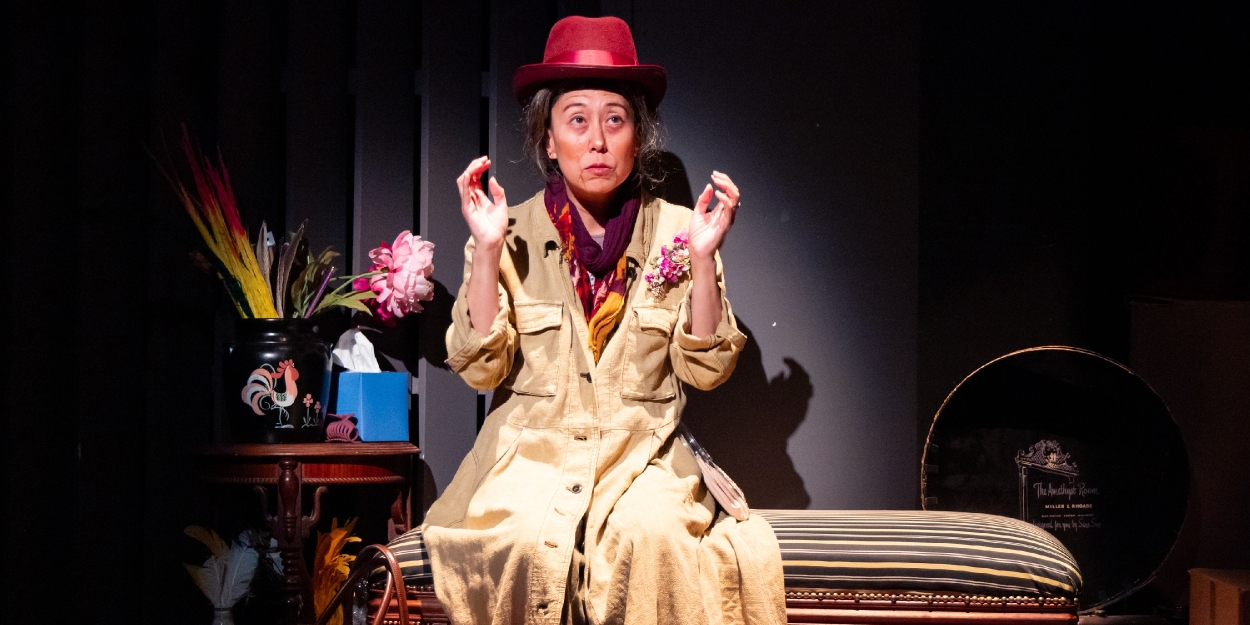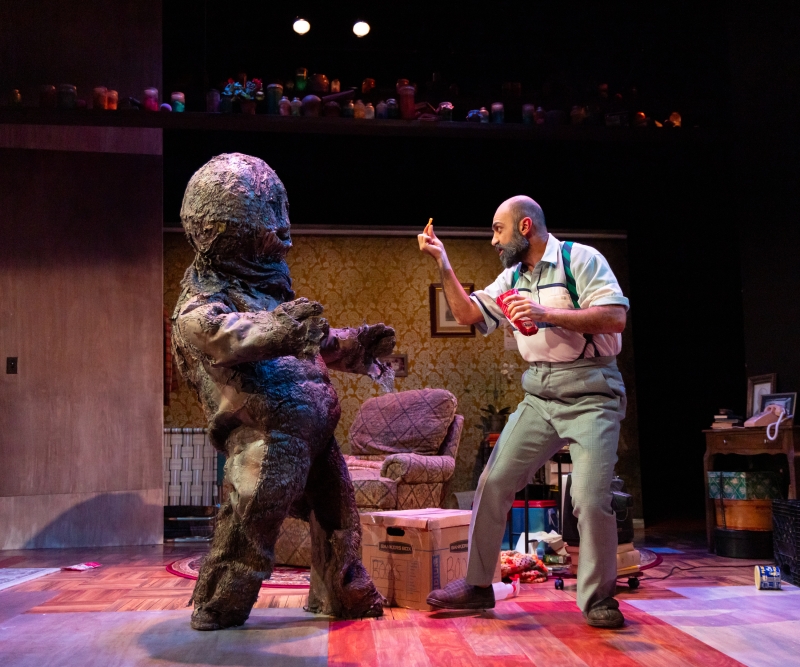Review: THE HATMAKER'S WIFE at Theater J
Now on stage through June 25th.

Love is a common theme in the arts, and love stories are popular for both creators and audiences. But stories about love can be so much more than just a love story, and far more complicated. The Hatmaker’s Wife, Theater J’s season closer, is a story about love in all its complexities. It examines love as a feeling, as an action, as something vital to our very beings. But it’s not a love story – in fact, many of the characters struggle with the concept of love itself, and are unable to understand or articulate it, even when it matters most.
The Hatmaker’s Wife is part drama, part ghost story, and part Yiddishkeit mythology, and playwright Lauren Yee weaves the various elements of this show into something even more magical than the world brought to life on Theater J’s stage. The show follows a young woman who has moved into a house in the suburbs with her long-term boyfriend, Gabe, and starts to hear unexplained noises in their new home. What starts as a passing, easily dismissed sound soon escalates to a sentient Wall, which shares the story of the house’s previous occupants, the hatmaker, Hetchman, and his wife. The woman soon becomes engrossed in the tale of the couple’s unhappy marriage, the wife’s attempt to find the contentment her husband holds, and the grounding power of the love we can give – or deny – each other. It soon becomes clear that the story is more than just a bit of lore about their new home, and there’s a deeper connection to be found across time, space, and self-exploration.

Yee’s script is incredibly compelling, managing to weave realistic people and relationships with the fantastic elements of a talking wall, a Cheeto-loving golem, and gravity-defying mythos. There’s a level of verisimilitude that her storytelling creates around even the most mystic components of the play, pulled off with the help of a fantastic cast, solid production elements, and Dan Rothenberg’s insightful direction. Even at its most absurd (there’s a brilliant scene with Hetchman, his friend Meckel, and the golem in a graveyard), there’s a steady, emotional element to Yee’s writing that captivates the audience and makes every element believably touching. At its core, The Hatmaker’s Wife is about the value of our relationships with each other – how we show love and respect for each other, and what happens to relationships when those aren’t nurtured. At the same time, there’s also a lovely humor woven into this production as well. Yee’s script is quietly funny, eliciting regular chuckles at mundane, daily absurdities, and showing viewers a complex, layered story full of complex, layered people.
The Hatmaker’s Wife is Rothenberg’s DC premiere, and hopefully his first of many directorial turns in this city. His deft approach to Yee’s play is venerable, and there’s a clear love for the layers of this story. The entire action takes place in a static set, yet the audience moves with the characters and their journeys with a smoothness that’s slyly pulling at heartstrings without ever feeling heavy-handed or flat.
This is also largely credited to the talented cast members, who seem to genuinely enjoy telling this particular story. When Maboud Ebrahimzadeh’s Hetchman is introduced, he plays the physical comedy of the hatmaker’s laziness in a way that’s both hilarious and incredibly telling; over time, he reveals other aspects of the character, drawing the audience in without ever losing the core of the man who refuses to compromise his comfort, even for his most beloved possessions. Sue Jin Song brings a quiet sadness and steadfastness to Hetchman’s Wife, the titular character who goes the majority of the show with her identity entirely forgotten in favor of her role. Song carries the character with a dignity and strength that makes a compelling character, drawing the audience’s attention even if she cannot capture her own husband’s. As Meckel, Hetchman’s friend and neighbor, Michael Russotto brings a levity to the production, adding charm into some of the more tragic moments, but serving as almost the mirror image of Song’s character – where she carries an unexpected strength, he shows an almost surprising level of selfishness, showing that even the kindest among us can still be deeply flawed. Tyler Herman, however, may have the most fun with his dual role: as Gabe, he gets to dig into an emotional portrayal of a man who slowly realizes that his relationship may not be what he thought it was, and he grapples with this frustration, isolation, and confusion skillfully. But, as the golem, he leans into a more charming, comical portrayal, even though the mythical being’s purpose is far beyond comedic relief. While the golem is a monstrous-sized mass of clay and dirt, there’s something almost adorable about Herman’s mannerisms. As the other mystic element, Alex Tatarsky has the difficult task of bringing to life a sentient, immobile object with only their voice, yet somehow gives the Wall a defined, sarcastic and inquisitive personality. Given that their portrayal is entirely dependent on tonal delivery, it’s incredible how emotive Tatarksy’s voice is, bringing to life the literal set piece. Leading the cast is Ashley D. Nguyen, who gives a gorgeous and emotional performance. In a show about identity and the value of recognition, it’s particularly fascinating that the lead character is never named, but the audience is so thoroughly engrossed in Nguyen’s character that this fact almost slips by; in some ways, her character is one everyone can relate to, the embodiment of the uncertainty of our place in the world and in the lives of those who are closest to us, and she captures this beautifully. While most of the emotional buildup of the production comes from Hetchman and his wife’s story, it’s Nguyen’s stunning revelations and her unresolved situation that really form the play’s heart.

Supporting this incredible and emotional work are Theater J’s rockstar production team members, who continue to impress with their work. Most notably, Misha Kachman’s scenic design is thoughtfully detailed and incredibly versatile, following the characters as they move through this fantastic tale, while also serving as a character. Alberto Segarra’s lighting design is striking, particularly when highlighting the scene changes and the clever jars Prop Designer Pamela Weiner decorates the set with as well as utilizes for the golem’s findings. Weiner’s excellent prop work also extends to the wonderful hats, which are of course pivotal to the story, and to a range of other thoughtfully detailed pieces throughout the production. Ivania Stack tackles the golem costume itself, somehow creating the perfect vacant expression while still allowing Herman’s movements to come through clearly. Sarah O’Halloran’s sound design is particularly clever, utilizing sound and silence thoughtfully, and also artfully pulling off one of the more comedic moments of the production by playing with sound and movement.
Theater J closes new Artistic Director Hayley Finn’s first season on an enchanting high note. The Hatmaker’s Wife is emotional, charming, and thoughtful, and it’s a piece that will stay with audiences long after the cast’s well-deserved bows.
The Hatmaker’s Wife runs at Theater J through June 25th. Performance run time is approximately 100 minutes, with no intermission. Information on tickets, accessibility, and community conversations can be found on the Theater J website.
Photo credit for banner photo: Sue Jin Song in Theater J’s production of The Hatmaker’s Wife, playing through June 25. Photo by Ryan Maxwell Photography.
Reader Reviews

Videos

